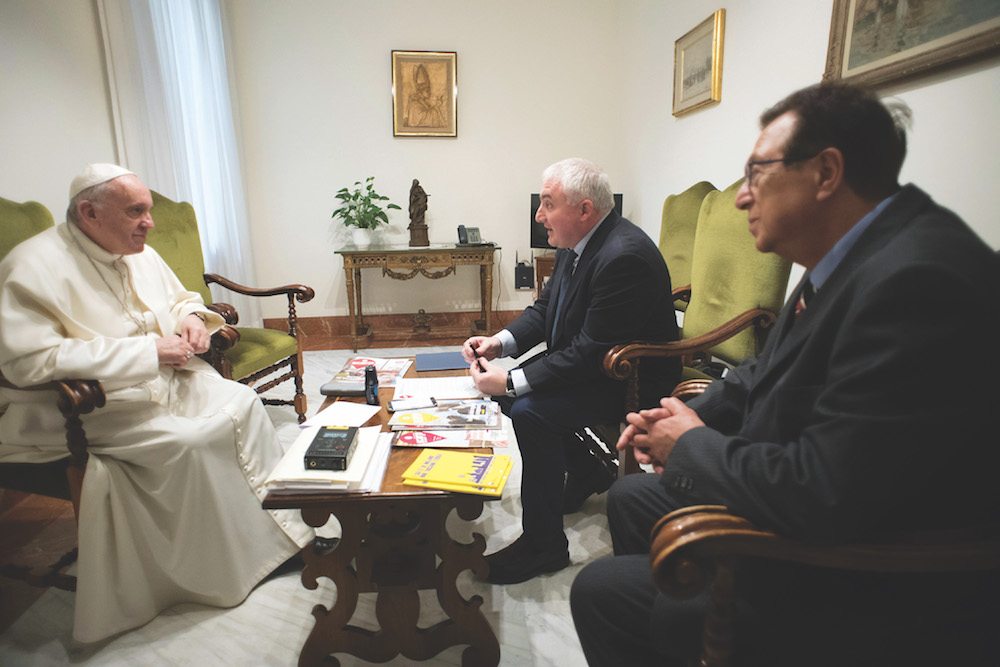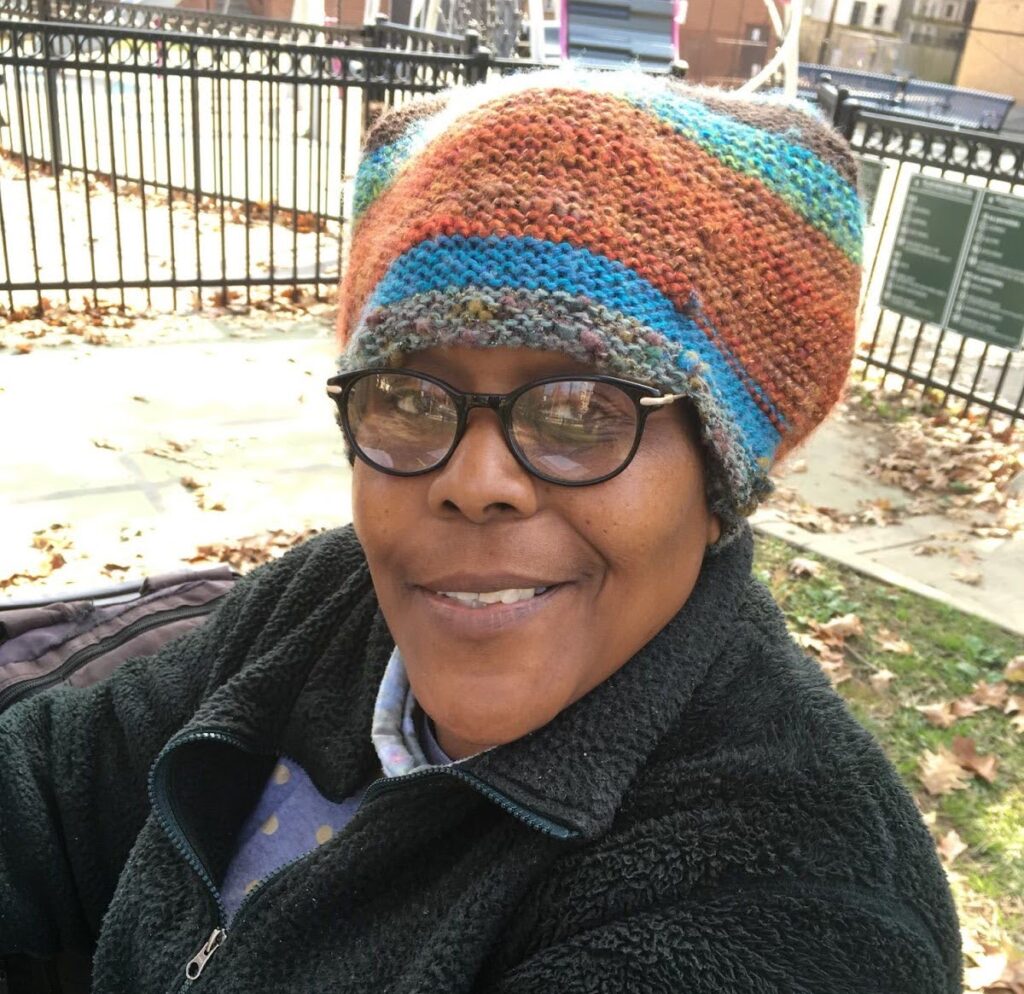By Stefano Lampertico
Scarp de tenis — Milan, Itlay
A year and a half since Pope Francis first spoke to the street paper movement, he has again sat down with one of the International Network of Street Papers’ members for an exclusive interview. The Holy Father met Scarp de tenis vendor Antonio Mininni and the paper’s editor Stefano Lampertico. He told them that it is “always right” to give alms to people begging for help on the streets.
Holy Father, let us talk about the invisible people, those who are homeless. A few weeks ago, at the start of winter when the cold became severe, you appealed to all the churches to open their doors and welcome homeless people. What was the reaction to your appeal?
The appeal was heard by many people in many parishes — they listened and answered. In the Vatican there are two parishes, and every parishioner welcomed a Syrian family as guests. Many churches in Rome opened their doors in welcome, and I know that some others, not having the space to host guests, raised enough money to cover a whole year’s rent for the needy and their families.
Our goal must be integration, and so it is important to provide support and company at the beginning. Much has been done, all over Italy. Catholic schools, convents and many other organisations all opened their doors. This is why I say the call was answered. I know that many people made monetary donations to help those without accommodation pay for somewhere to stay.
Much has been written about the papal shoes. The media devoted considerable attention to your chosen new pair [in 2013, Pope Francis abandoned the handmade red leather shoes of his predecessor for more modest black ones]. Why did the shoes capture the public’s imagination to such a degree? Is it because in today’s climate we find it increasingly difficult to put ourselves in someone else’s shoes?
It is tiring to put yourself in another’s shoes, because often we are slaves to our own egotism. At the most basic level we could say that people prefer to think about their own problems than to fully acknowledge the difficulties of others. There is another aspect to it, however. To put yourself in the shoes of another requires a great capacity for understanding, to comprehend a situation and all its difficulties. I’ll give you an example: In times of mourning most people send their condolences; they attend the wake or the funeral mass, but few will truly imagine themselves in the shoes of the bereaved. Certainly, it isn’t easy. They feel grief, but that is all. Consider how life necessarily involves solitude — we often lonely, and putting yourself in another’s shoes is an embodiment of servitude, humility, magnanimity. It is also an admission of need: I need someone to put themselves in my shoes, too. Because we all have need of understanding, of company and of counsel.
How many times have I met a person who, after seeking comfort from a Christian — be it a layperson, a priest, a nun, a bishop — has told me: “Yes, they listened to me, but they didn’t understand me.” True understanding means putting yourself in the shoes of another. And it isn’t easy. Sometimes to make up for a lack of greatness, a richness of humanity, we lose ourselves in words. We talk, we talk; we give advice. But when there are only words — in a way too many words — then we never achieve the “greatness” required to put ourselves the shoes of another.
Your Holiness, when you meet someone who is experiencing homelessness, what is the first thing you say to them?
“Hello, how are you?” Sometimes we only exchange a few words, other times we are able to build rapport and I am able to listen to fascinating stories: “When I was studying at college …” or “I once knew a really good priest …”
You may ask, why does this interest me? People who live on the streets can tell immediately if there’s genuine interest from the person speaking to them or if it’s only out of — I don’t want to call it compassion — it’s more like penitence. Some people see a homeless person just as another person — others treat them as if they were a dog. If you look at someone differently, they of course realise it.
In the Vatican, there is a famous story of a homeless man, of Polish origin, who could normally be found at the Piazza Risorgimento in Rome. He never spoke to anyone, not even the Caritas [Catholic charity] volunteers who would bring him a hot meal in the evening. Only after a long time were they able to learn his story: “I am a priest, I know your Pope well; we studied together at the seminary.” These words eventually reached Saint John Paul II, who heard the name and confirmed they had been at the seminary together. He wanted to meet this man. They embraced after 40 years apart, and after an audience the Pope asked him to hear his confession — this priest who had once been his friend. Afterwards, he said to the Pope, “Now it’s your turn.” And the Pope heard his confession.
Thanks to the deeds of the volunteer, a kind look, a hot meal and some words of comfort, this man was able to resume the path to a life like his old one, eventually working as the chaplain of a hospital. The Pope helped him, certainly, perhaps this counts as a “miracle” but it’s also an example to remember grand dignity that the homeless possess.
When I was archbishop of Buenos Aires, a homeless couple and a family lived under the archway to our entrance hall, between the pavement and the grilles. I met them every morning when I went out. I always said hello, and we would exchange a few words. It never occurred to me to chase them away. Somebody once said to me, “They are a stain on our church,” but to me those words were the stain. I think one must treat all people with humanity, not as if they owe you a debt, and not as if they were impoverished dogs.
Many wonder if they should give alms to those who beg for help on the street. What would you answer?
There are many ways to justify one’s actions when not giving alms. “But why should you? If I give him money he’ll just spend it on a glass of wine.” If a glass of wine is his only happiness in life, then so be it. Ask yourself instead what you do, when you’re alone. What secret “happiness” do you pursue?
Or, when you compare yourself to him, you see yourself as more fortunate, with a house, a spouse, a family, and so you find yourself saying, “Let the rest of you worry about him!”
It is always right to give help. Of course, that doesn’t mean it’s good to just throw some coins in the direction of a beggar. What matters more is a good deed, helping someone who asks you for help, looking in their eyes and touching their hands. Throwing money at someone without looking at them is not a Christian gesture.
How can you teach someone to help?
Let me tell you the story of a lady I knew in Buenos Aires, mother to five children, although at that time she had only three. Their father was at work, and they were at home having lunch, when they heard a knock at the door. The eldest went to open it. “Mamma, there’s a man at the door asking for something to eat,” he returned to say. “What should we do?” The three children, the youngest of whom was four, were sharing bistecca alla Milanese [a beef steak in breadcrumbs]. “All right,” said the woman, “we’ll cut our steaks in half for him.” “But Mamma, there’s another whole one,” protested the children. “That’s for this evening, for your father,” she replied. “If we are to give, we must give what is our own.” With these simple words the children learnt that you must give away only what belongs to you.
Your own family history includes your father’s parents, with their son, crossing the ocean to Argentina. What was it like growing up the child of an immigrant? Did you ever feel uprooted, at all?
I never felt uprooted, or out of place. In Argentina we are all immigrants. That is why interfaith dialogue is the norm. I went to school with Jewish immigrants who had mostly come from Russia, as well as Syrian and Lebanese Muslims, or Turks with passports from the Ottoman Empire. We were a brotherhood. There were few people of indigenous origin. For the most part we were originally Italian, Spanish, Polish, Middle Eastern, Russian, German, Croat, Slovenian … In the last two centuries migration has been a far-reaching phenomenon. My father was in his 20s when he arrived in Argentina, and he worked in the Bank of Italia. He was married there. ■
This interview has been condensed for space. Translated from Italian to English by Eleanor Susan Lim, courtesy of Scarp de’ tenis / INSP.ngo.








